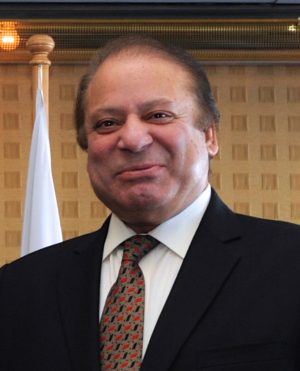On Monday, Pakistan’s opposition-led All Parties Conference (APC) announced its plan to challenge the military’s dominance of domestic politics.
However, serious divisions have emerged within the opposition’s ranks over the issue, showing that Pakistan’s politicians do not have a strategy or firm commitment to the idea of reversing the military’s role in the country’s politics.
So far, the opposition has targeted the Pakistan Tehreek-e-Insaf (PTI) government for fostering the military’s role and carrying out a ruthless accountability campaign with the blessing of the security establishment. “Our struggle isn’t against (Prime Minister) Imran Khan but with the forces that have installed his illegitimate government to power,” said Nawaz Sharif, Pakistan’s former prime minister and the leader of the Pakistan Muslim League-Nawaz (PMLN) at the APC huddle. “We want elected leaders to run the affairs of the country, to manage the economy, and to decide on the foreign policy,” said Sharif.
However, growing evidence suggests that Pakistan’s political parties are not committed to the goal of establishing civilian supremacy in the country. One of the major hurdles in this regard is their intent to work with the military rather than opting for any other course. Politicians in Pakistan have become accustomed to the idea of appeasing the security establishment and earning their blessings to fulfill their basic governance and political needs.
For instance, Sharif announced that no compromise can be made with the military establishment and civilian supremacy should be the only way forward. Sharif’s daughter has also claimed that there is no truth in statements that the PMLN has been seeking relief from the national security establishment.
On Wednesday, however, the director-general of the military’s media wing revealed that a senior leader of the PMLN met the chief of army staff, General Qamar Javed Bajwa, twice in the span of the last two weeks to discuss Sharif and his daughter’s political and legal issues. “In both meetings, he [the PMLN leader] talked about Nawaz Sharif and Maryam Nawaz,” the DG said. The disclosure comes after Sharif’s younger brother Shahbaz Sharif admitted to meeting Bajwa and the director general of the Inter-Services Intelligence (ISI), the country’s leading spy agency.
The revelations from the Army came after Sharif’s daughter targeted the military for calling politicians to the military headquarters to discuss constitutional matters. While talking about the opposition leaders’ recent meeting with Bajwa, Maryam Nawaz said that “from what I understand, it was called to discuss Gilgit-Baltistan which is a political issue, an issue of the people’s representatives, for them to solve and deliberate upon.”
“These decisions should be made in the parliament, not in GHQ,” she added, referring to the Pakistan Army’s General Headquarters.
PMLN is not the only party that has been trying to reach out to the military to seek support on political and legal issues. The leader of Pakistan’s Peoples Party (PPP), Bilawal Bhutto, also met Bajwa last week along with other political leaders of the party. Over the last two years, the PPP’s leadership has taken a tough stance against the military’s support for the PTI government. The PPP has criticized the military for its interference in the 2018 general election and assisting the PTI government in its politically motivated accountability campaign against the PPP in Sindh province. In July, Bhutto had criticized a senior leader of his party for meeting Bajwa.
However, the party’s approach toward the military has grown conciliatory after the recent meetings with the military leadership. Terming Bajwa’s approach as a “welcome development,” Bhutto said that the military wants a free and fair election in Gilgit-Baltistan. He also noted that the PPP didn’t agree with the military leadership on the last general election but going forward, it believes that a transparent election will take place in Pakistan.
Arguably, the recent revelations about the opposition leaders’ meetings with the military leadership have neutralized the pressure and legitimacy that the opposition’s ranks may have built against the current government. All major political parties in Pakistan have been secretly approaching the military leadership in an effort to normalize relations with that institution.
Going forward, it is unclear how the opposition parties will rally mass support for their announced agitation campaign against the government. The PMLN should be worried about the growing fault lines within the party’s ranks while the PPP needs to introspect how it will counterbalance the federal government’s growing presence in Sindh.
There are interesting days ahead, as Pakistani politicians re-align their strategies.

































